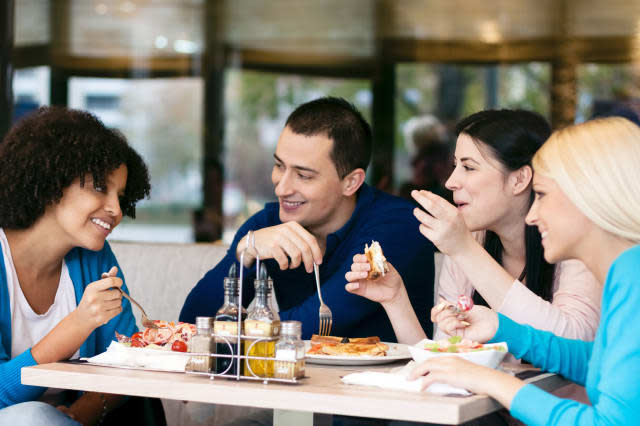How to get the best deal when eating out

The way we see eating out has changed radically over the years. A generation ago it was something to savour once or twice a year: nowadays the average person in Britain eats out 128 times a year. It accounts for just over a fifth of every penny we spend on food, and the market is worth £25 billion.
However, with money getting tighter each year, we're far more canny about the money we spend in restaurants, cafes and takeaways. Now we know we can get a better deal, and there are ten great ways to ensure we pay less.
1. Vouchers
%VIRTUAL-ArticleSidebar-deals%
The restaurant discount industry has been around for more than two decades, but most people only really became aware of it with the explosion of voucher sites in 2008. Nowadays, a quick hunt for discounts before you leave the house - or even a location-based search on your phone when you are ready to eat - can shave 25% or more off the cost of your meal.
A few years ago these deals would only apply outside of peak times. However, if you are diligent, you can find a deal in your area whenever you want to eat.
Search for food vouchers on AOL Deals
2. Promotions
You don't need a voucher if you are wise to the regular promotions run by restaurants. The pizza takeaway industry, for example, is engaged in a Tuesday-based war for custom, so chains and independents alike will offer two for the price of one on Tuesdays. Wherever you eat, check what they offer on a regular basis.
3. Sign up for a newsletter
Signing up to online newsletters or loyalty schemes will increase the number of regular emails you get from restaurants, but many of them will contain discount vouchers, so it's worth checking your inbox. Some restaurants will offer regular discounts - such as La Tasca's 20% off everything - while others will offer free starters or puddings when you sign up.
4. Consider a restaurant card
These charge an annual fee, which at full price can be around £80. However, if you search for deals on the cards themselves, you should be able to get a month free, or a discounted price all year. Once you have a card, you are entitled to discounts of around 50% at thousands of restaurants in the UK (or two for the price of one). However, it's worth bearing in mind that these tend to be off-peak deals, so may only pay if you eat out regularly during the week.
Article continues below

5. Tell them when it's your birthday
All sorts of restaurants will offer you something for your birthday - ranging from a free meal when you bring enough guests, to a free bottle of bubbly. You'll usually only get these offers if you have signed up for the restaurant's newsletter or loyalty card, so it's worth checking whether your favourite restaurant or chain has a list you can sign up to.
6. Check the prix-fixed deals
Typically restaurants will offer a fixed price for two or three courses, either earlier in the evening, at lunchtime, or on an off-peak day. These are typically much cheaper than ordering two courses from the a la carte menu - although it's always worth doing the maths to check you are getting a decent saving given that you're restricting your choices.
%VIRTUAL-ArticleSidebar-shopping-guide%
7. Consider value when you check the menu - not just price
When we're feeling frugal, we might automatically look for the cheap things on the menu like a soup or a pasta dish. However, often these cost pennies to make, and so have one of the biggest mark-ups on the menu. If you are on a tight budget you might decide to go for them anyway, but if you are interested in value rather than cost, you could find some cuts of meat have a far smaller mark-up.
8. Don't be up-sold by the waiter
Even when you know what you want, when the waiter arrives and asks if you want some olives or bread to start with, or a side dish between you, it's easy to be persuaded into buying more. This is partly because we don't want to have a discussion in front of the waiter about whether we really want these things and whether they are worth the money. It pays, therefore, to have the discussion before the waiter arrives, check the prices of these extras, and decide whether they are worth the money.
9. Don't drink
A bottle of wine is usually at least twice as expensive in a restaurant than it would be to buy and drink at home, while a glass of wine or a soft drink is easily five times more expensive. Tap water is the bargain-hunter's best solution (especially if the restaurant offers free filtered water).
If you really want a glass of wine, and you are interested in value rather than simply the price, then it's worth avoiding the house wine and the second-cheapest wine on the menu. These tend to be the two wines with the biggest mark-ups, so while they are cheaper, they're not necessarily more of a bargain.
10. Beware of desserts
When a meal has been a pleasure, you might be tempted to make the evening last by having a dessert, but this is often where the restaurant will sting you. Unless you are in a fine dining restaurant with its own pastry chef, you can easily pay between £5 and £8 for a bowl of ice cream or a slice of cake.
Food and drink on AOL Money
Bubblegum-flavoured broccoli, anyone?
Eat less if you can't afford organic - Vivienne Westwood
Asda charges almost double for bananas in bags




